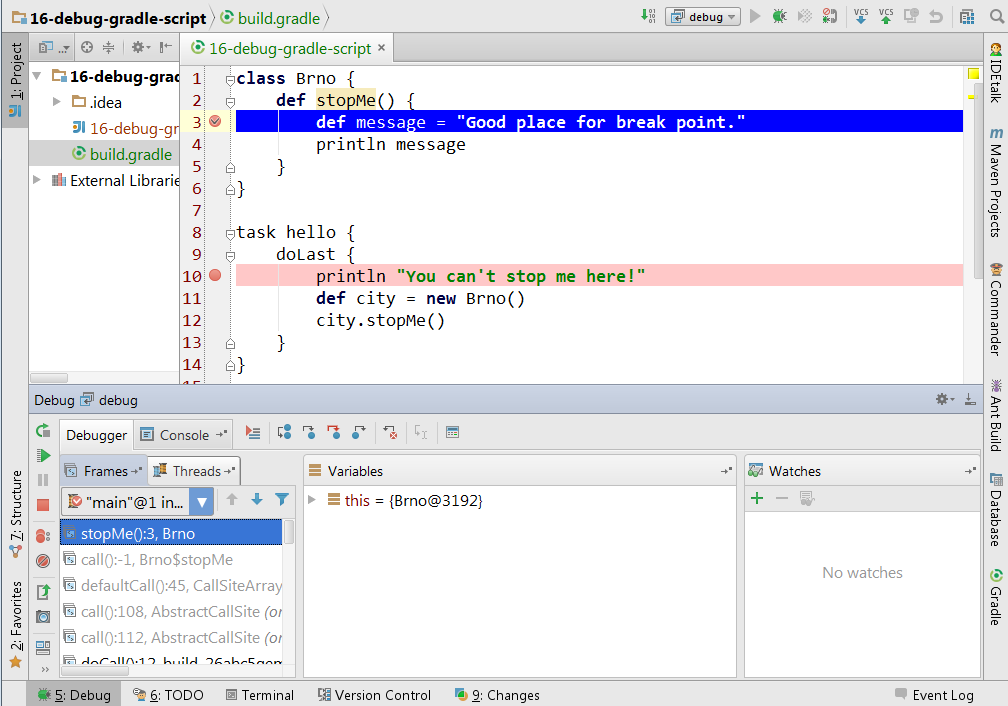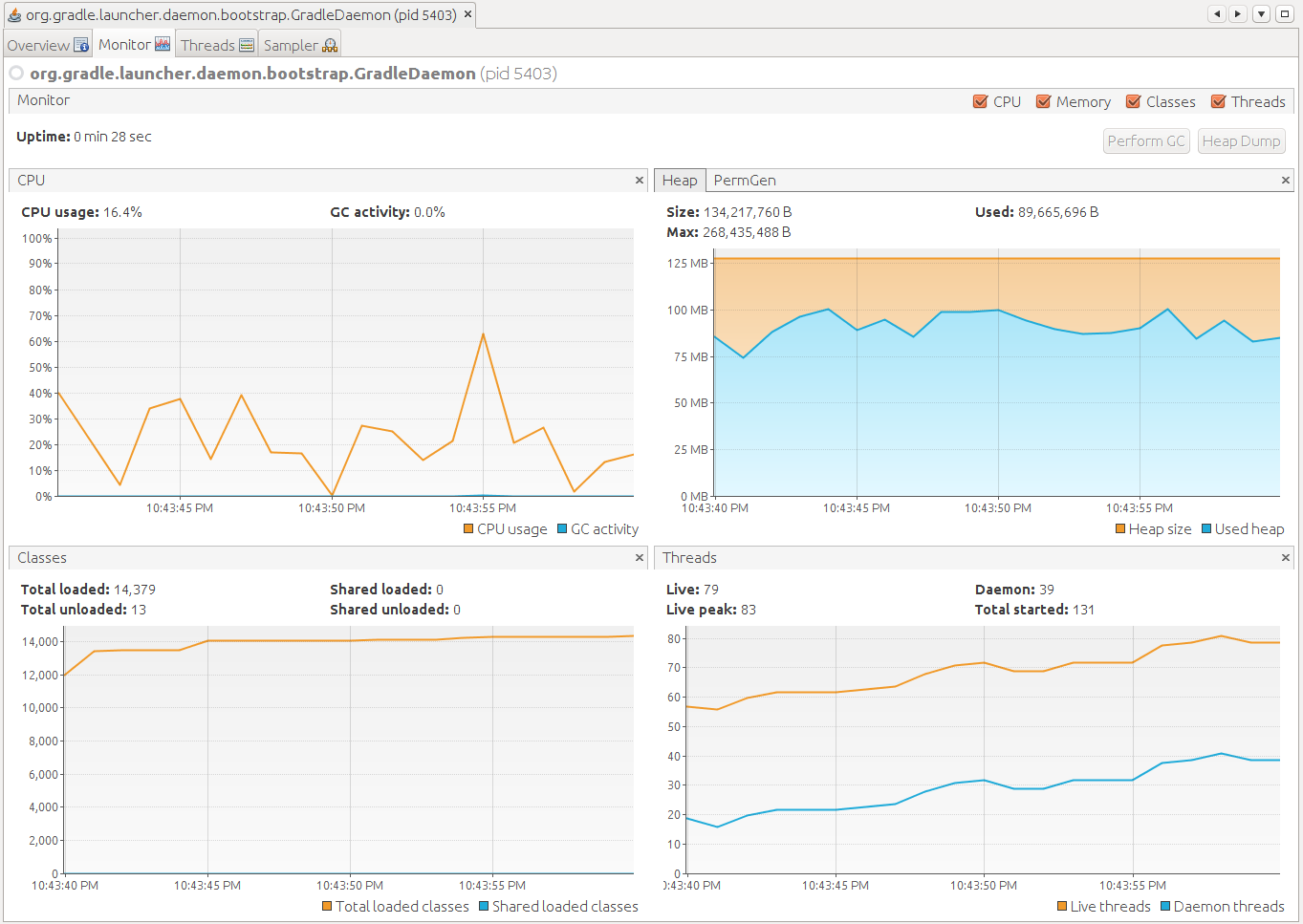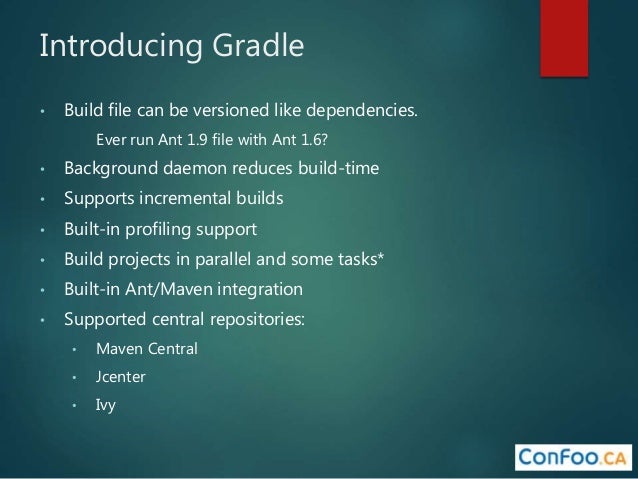Google says it would most likely be gradle running out of memory. Stack Exchange Network Stack Exchange network consists of 176 Q&A communities including Stack Overflow, the largest, most trusted online community for developers to learn, share their knowledge, and build their careers. Expected Behavior Gradle daemon should not get killed unexpectedly. Current Behavior The Gradle daemon just crashes. If the environment variables have Japanese and/or space. Though I dont know why env var are listed in logs of gradle bui. If you wish to stop a Daemon process manually, you can either kill the process via your operating system task manager or run the gradle -stopcommand. The -stopswitch causes Gradle to request that all running Daemon processes, of the same Gradle version used to run the command, terminate themselves.
Example
You can enable the Gradle Daemon to improve the performance of your builds.
The Gradle Daemon keeps the Gradle Framework initialized and running, and caches project data in memory to improve performance.
For a Single Build

To enable the Daemon for a single build, you can simply pass the --daemon argument to your gradle command or Gradle Wrapper script.

For All Builds of a Project
To enable the Daemon for all builds of a project, you can add:
To your project's gradle.properties file.
For All Builds

To enable the Gradle Daemon by default, for every build made by your user account on your system, edit $GRADLE_USER_HOME/.gradle/gradle.properties (~/.gradle/gradle.properties by default) and add this line:
You can also do this in a single command on Mac/Linux/*nix systems:
Or on Windows:
Disabling the Daemon
You can disable the Daemon for a specific build using the --no-daemon argument, or disable it for a specific project by explicitly setting org.gradle.daemon=false in the project's gradle.properties file.
Stopping the Daemon

If you wish to stop a Daemon process manually, you can either kill the process via your operating system task manager or run the gradle --stop command. The --stop switch causes Gradle to request that all running Daemon processes, of the same Gradle version used to run the command, terminate themselves. Ordinarily, Daemon processes will automatically terminate themselves *after *3 hours of inactivity or less.
This article is outdated.I recommend checking the Gradle performance documentation for up-to-date information.
If you use the new Gradle build system with Android (or Android Studio) you mighthave realized, that even the simplest Gradle call (e.g. gradle project or grade tasks)is pretty slow. On my computer it took around eight seconds for that kind of Gradlecalls. You can decrease this startup time of Gradle (on my computer down to two seconds),if you tell Gradle to use a daemonto build.
Since Gradle 3.0 the daemon is turned on by default.

Just create a file named gradle.properties in the following directory:
- /home/<username>/.gradle/ (Linux)
- /Users/<username>/.gradle/ (Mac)
- C:Users<username>.gradle (Windows)
Gradle Stop Daemon Games
Add this line to the file:
Restart Gradle Daemon
From now on Gradle will use a daemon to build, whether you are using Gradle from commandline or building in Android Studio. You could also place the gradle.properties file tothe root directory of your project and commit it to your SCM system. But you wouldhave to do this, for every project (if you want to use the daemon in every project).
Note: If you don’t build anything with Gradle for some time (currently 3 hours),it will stop the daemon, so that you will experience a long start-up time at the next build.
Gradle Stop Daemon Software
Note: Performance improvements are one of the great tasks in the Gradle roadmap for 2014(and reaching into 2015). So I hope, we’ll see the general performance increasing within these years.
Note: This does only affect console builds. Android Studio always uses a Gradledaemon (and depending on your settings some other optimizations).
